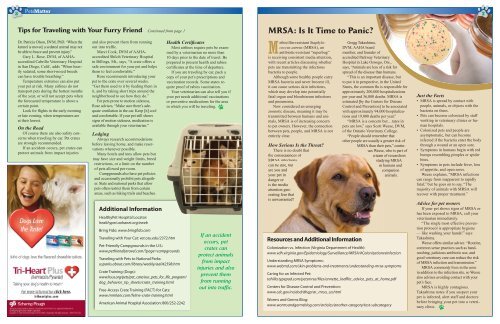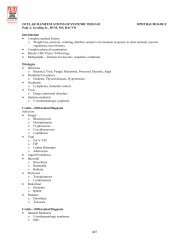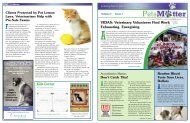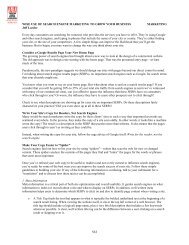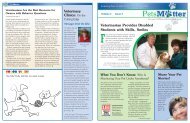Anaplasmosis: The Unsung Tick Disease Pets a Go Go: Tips for ...
Anaplasmosis: The Unsung Tick Disease Pets a Go Go: Tips for ...
Anaplasmosis: The Unsung Tick Disease Pets a Go Go: Tips for ...
You also want an ePaper? Increase the reach of your titles
YUMPU automatically turns print PDFs into web optimized ePapers that Google loves.
2 <strong>Pets</strong>Matter7<strong>Tips</strong> <strong>for</strong> Traveling with Your Furry Friend Continued from page 1MRSA: Is It Time to Panic?Dr. Patricia Olson, DVM, PhD. “When thekennel is moved, a sedated animal may notbe able to brace and prevent injury.”Gary L. Rose, DVM, of AAHAaccreditedCabrillo Veterinary Hospitalin San Diego, Calif., adds “When heavilysedated, some short-nosed breedscan have trouble breathing.”Temperature extremes can also putyour pet at risk. Many airlines do nottransport pets during the hottest monthsof the year, or will not accept pets whenthe <strong>for</strong>ecasted temperature is above acertain point.Look <strong>for</strong> flights in the early morningor late evening, when temperatures areat their lowest.On the RoadOf course there are also safety concernswhen traveling by car. Pet cratesare strongly recommended.If an accident occurs, pet crates canprotect animals from impact injuriesand also prevent them from runningout into traffic.Marci Cook, DVM of AAHAaccreditedShiloh Veterinary Hospitalin Billings, Mt., says, “A crate offers asafe environment <strong>for</strong> your pet and helpsthem to feel com<strong>for</strong>table.”Rose recommends introducing yourpet to the crate over several weeks.“Get them used to it by feeding them init, and by taking short trips around theneighborhood to see how they do.”For pets prone to motion sickness,Rose advises, “Make sure there’s adequateventilation in the car. Keep [it] cooland com<strong>for</strong>table. If your pet still showssigns of motion sickness, medication isavailable through your veterinarian.”LodgingAlways research accommodationsbe<strong>for</strong>e leaving home, and make reservationswhenever possible.Many hotels and inns allow pets butmay have size and weight limits, breedrestrictions, or a limit on the numberof pets allowed per room.Campgrounds also have pet policiesand occasionally prohibit pets altogether.State and national parks that allowpets often restrict them from certainareas, such as hiking trails and beaches.Additional In<strong>for</strong>mationHealthyPet Hospital Locator:healthypet.aahanet.org/ewebBring Fido: www.bringfido.comTraveling with Your Cat: vet.osu.edu/2372.htmPet-Friendly Campgrounds in the U.S.:www.petfriendlytravel.com/?page=campgroundsTraveling with <strong>Pets</strong> to National Parks:usparks.about.com/library/weekly/aa042598.htmCrate Training (Dogs):www.hsus.org/pets/pet_care/our_pets_<strong>for</strong>_life_program/dog_behavior_tip_sheets/crate_training.htmlFree-Access Crate Training (FACT) <strong>for</strong> Cats:www.mmilani.com/feline-crate-training.htmlAmerican Animal Hospital Association: 800/252-2242Health CertificatesMost airlines require pets be examinedby a veterinarian no more than10 days prior to the date of travel. Beprepared to present health and rabiescertificates at the time of departure.If you are traveling by car, pack acopy of your pet’s prescriptions andvaccination records. Some states requireproof of rabies vaccination.Your veterinarian can also tell you ifyour pet needs additional vaccinationsor preventive medications <strong>for</strong> the areain which you will be traveling.If an accidentoccurs, petcrates canprotect animalsfrom impactinjuries and alsoprevent themfrom runningout into traffic.Methicillin-resistant Staphylococcusaureus (MRSA), anantibiotic-resistant “superbug”is receiving consistent media attention,with recent articles discussing whetherpets are transmitting the infectiousbacteria to people.Although some healthy people carryMRSA bacteria and never become ill,it can cause serious skin infections,which may develop into potentiallyfatal organ and bloodstream infectionsand pneumonia.Now considered an emergingzoonotic disease, meaning it may betransmitted between humans and animals,MRSA is of increasing concernto pet owners. However, the connectionbetween pets, people, and MRSA is notentirely clear.How Serious Is the Threat?<strong>The</strong>re is no doubt thatthe consequences ofMRSA infectionscan be dire, butare you andyour pet indanger oris the mediaattention generatingfear thatis unwarranted?Resources and Additional In<strong>for</strong>mationGregg Takashima,DVM, AAHA boardmember, and founder ofaccredited Parkway VeterinaryHospital in Lake Oswego, Ore.,says, “Animals are less of a risk <strong>for</strong>spread of the disease than humans.“This is an important disease, butto put it in perspective, in the UnitedStates, the common flu is responsible <strong>for</strong>approximately 200,000 hospitalizationsper year and 36,000 deaths. MRSA isestimated [by the Centers <strong>for</strong> <strong>Disease</strong>Control and Prevention] to be associatedwith approximately 94,000 hospitalizationsand 19,000 deaths per year.”“MRSA is a concern but…rates inpets are low,” says Scott Weese, DVM,of the Ontario Veterinary College.“People should remember thatother people are usually a greater risk ofMRSA than their pets,” contin-ues Weese, who is part ofa team of researchersstudying MRSAin humans andcompanionanimals.Colonization vs. Infection (Virginia Department of Health):www.vdh.virginia.gov/Epidemiology/Surveillance/MRSA/#ColonizationvsInfectionUnderstanding MRSA Symptoms:www.webmd.com/skin-problems-and-treatments/understanding-mrsa-symptomsCaring <strong>for</strong> an Infected Pet:tahilla.typepad.com/petsmrsa/files/annette_loeffler_advice_pets_at_home.pdfCenters <strong>for</strong> <strong>Disease</strong> Control and Prevention:www.cdc.gov/ncidod/dhqp/ar_mrsa_ca.htmlWorms and Germs Blog:www.wormsandgermsblog.com/articles/another-category/test-subcategoryJust the Facts• MRSA is spread by contact withpeople, animals, or objects with thebacteria on them.• <strong>Pets</strong> can become colonized by staffworking in veterinary clinics or humanhospitals.• Colonized pets and people areasymptomatic, but can becomeinfected if the bacteria enter the bodythrough a wound or an open sore.• Symptoms in humans begin with redbumps resembling pimples or spiderbites.• Symptoms in pets include fever, lossof appetite, and open sores.Weese explains, “MRSA infectionscan range from inapparent to rapidlyfatal,” but he goes on to say, “<strong>The</strong>majority of animals with MRSA willrecover with proper treatment.”Advice <strong>for</strong> pet ownersIf your pet shows signs of MRSA orhas been exposed to MRSA, call yourveterinarian immediately.“<strong>The</strong> single most effective preventionprotocol is appropriate hygiene— like washing your hands!” saysTakashima.Weese offers similar advice. “Routine,common sense practices such as handwashing,judicious antibiotic use, andgood veterinary care can reduce the riskof MRSA infection and transmission.”MRSA commonly lives in the nosein addition to the infection site, so Weesealso advises avoiding contact with yourpet’s face.MRSA is highly contagious.Takashima notes if you suspect yourpet is infected, alert staff and doctorsbe<strong>for</strong>e bringing your pet into a veterinaryclinic.


